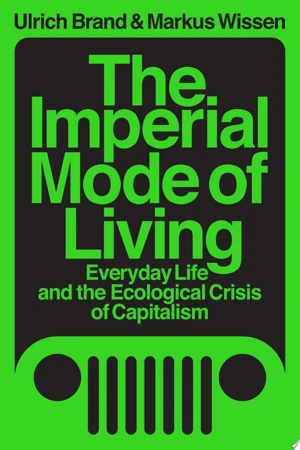The Imperial Mode of Living – Everyday Life and the Ecological Crisis of Capitalism

Blurb
Our Unsustainable Life: Why We Can't Have Everything We Want
With the concept of the Imperial Mode of Living, Brand and Wissen highlight the fact that capitalism implies uneven development as well as a constant and accelerating universalisation of a Western mode of production and living. The logic of liberal markets since the 19thCentury, and especially since World War II, has been inscribed into everyday practices that are usually unconsciously reproduced. The authors show that they are a main driver of the ecological crisis and economic and political instability. The Imperial Mode of Living implies that people's everyday practices, including individual and societal orientations, as well as identities, rely heavily on the unlimited appropriation of resources; a disproportionate claim on global and local ecosystems and sinks; and cheap labour from elsewhere. This availability of commodities is largely organised through the world market, backed by military force and/or the asymmetric relations of forces as they have been inscribed in international institutions. Moreover, the Imperial Mode of Living implies asymmetrical social relations along class, gender and race within the respective countries. Here too, it is driven by the capitalist accumulation imperative, growth-oriented state policies and status consumption. The concrete production conditions of commodities are rendered invisible in the places where the commodities are consumed. The imperialist world order is normalized through the mode of production and living.
Book summary
Imperialism is not only about military force and political pressure, applied by developed capitalist countries on less developed ones for economic gain. It also has an everyday dimension. Countless acts of production and consumption, the current SUV boom being a prominent example, draw on exploitation of resources and labour from 'elsewhere' and externalize their socio-ecological costs within societies and internationally.
Drawing on a Gramscian understanding of hegemony, the concept of an imperial mode of living connects the everyday life of people to overarching political and economic dynamics. Ulrich Brand and Markus Wissen develop a perspective to effect a radical socio-ecological transformation and found a mode of living based on solidarity.
Comment from our editors:
The Imperial Mode of Living is the culmination of half a decade of research and critical exchange of thoughts within a wider collective. Initially, the concept itself started to be first discussed and developed in workshops held by the Rosa Luxemburg Foundation and the collective 'imperial mode of living and solidary alternatives' (click here for more information on the I.L.A. collective). It is a useful concept in order to comprehend the persistence of the capitalist mode of production and reasons why this dominant mode of production has become so deeply ingrained in modern societies' everyday practices, consumption and lifestyle choices and institutional settings — and still having the capacity to attract new members of the global middle and upper classes. The imperial mode of living problematises the convenient standard of living within advanced capitalist core economies being based on the systematic exploitation of both labour and nature elsewhere, i.e. the availability of a cheap work force in the less developed periphery and of natural resources such as agricultural land, fossil fuels or minerals in the hinterland. The approach is being unjustly criticised for its apparent emphasis of individual agency over attempts at organisational changes in and through trade unions, political parties and businesses as the authors see themselves in the tradition of so-called 'radical reformism' and hence do not privilege one route of strategic action over another. The concept is furthermore a powerful tool to question our modern way of life and to see through so-called 'fake solutions'/'false alternatives' in a somewhat 'green capitalism' vis-à-vis a truly climate-friendly, more egalitarian societal edifice.

